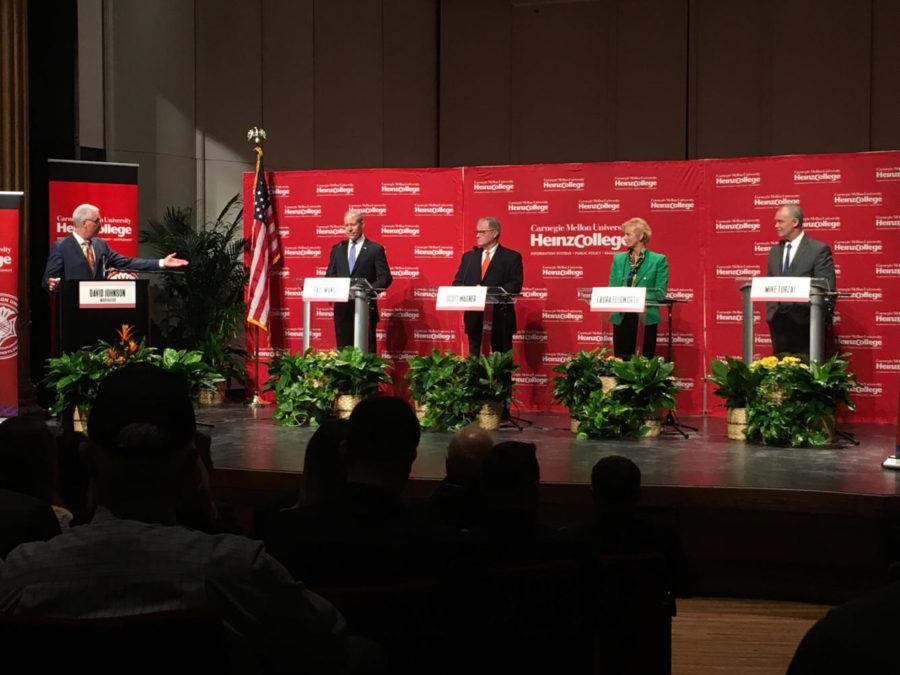The crowd erupted into a mix of boos and cheers at the in Kresge Theatre Saturday night when Laura Ellsworth admitted she did not vote for President Donald Trump in the 2016 presidential election, favoring another Republican candidate — John Kasich — instead.
“The reason that I didn’t support President Trump was because there was a divisiveness that I thought he brought that was going to, at best, be a distraction to our country. There was so many things that I liked what he was saying but the divisiveness bothered me,” Ellsworth said.
Ellsworth — who is running against Paul Mango, Scott Wagner and Mike Turzai in the Republican primary for Pennsylvania governor — explained further what she did like about the Trump presidency, such as his Supreme Court nominee Neil Gorsuch, his work with veterans and deregulation.
“I do not agree with everything that he does. I don’t agree with everything my husband does, and I love him. But that’s where I am at,” Ellsworth said.
WPXI anchor David Johnson, the debate moderator, probed the four participants’ opinions of Trump and other topics at the Pennsylvania Republican Gubernatorial Debate, held Saturday night at Carnegie Mellon University’s College of Fine Arts building. The live-streamed event — with about 250 people attending in person — featured a mix of questions from WPXI, CMU students and those submitted to WPXI’s website, with topics ranging from infrastructure to the opioid crisis.
Candidates were given two minutes to make an opening statement and then launched into answering questions. Contrary to the title of the event, the candidates did not actually debate one another. They had at most a minute and a half to respond to questions after the order was determined by pulling names from a Penguins hat.
The other three Republican gubernatorial candidates were firm yeses on supporting Trump. Mango said he voted for Trump in both the primary and general election and gave the maximum amount of $2,700 to Trump’s campaign, which was met with enthusiastic applause.
“I think he’s doing an outstanding job. He’s for jobs and economic growth. He’s for infrastructure and development. He is for bringing dignity back to skilled labor,” Mango said. “I just think the direction we would have been in with the alternative would have been a disaster for the United States.”
The debate kicked off with each candidate being asked if they thought current Pennsylvania Gov. Tom Wolf’s declaration of a statewide emergency for the opioid epidemic was an appropriate response or if they thought more was required. Mango took his time to criticize Wolf on this subject, and in later question responses, called him a “liberal progressive socialist governor” — a term he repeated twice more during the debate.
“Last summer I was on Fox News, on national news, and I asked our governor in June to declare a statewide emergency. Since then, 3,000 Pennsylvanians have died,” Mango said. “That’s not leadership. Leadership is anticipating when things go wrong and ensure you take care of your people. Gov. Wolf has not done that.”
Wagner said the crisis is complex, and Pennsylvania’s method of pushing people through rehabilitation too quickly is not working. He called for more education on the dangers of drugs among younger children.
“We are going to have to go deep into our schools and we’re going to have to educate,” Wagner said. “If a child’s a toddler and they go into a public setting, a daycare facility, they need to hear that drugs are bad, needles are bad, drug dealers are bad.”
While all four candidates supported medical marijuana and were against its distribution for recreational use, there wasn’t agreement on the topic of gerrymandering. There is controversy surrounding how the state congressional map was drawn, but Turzai was pleased with how it was passed.
“The fact of the matter is when it was passed in the House it was a bipartisan vote,” Turzai said. “The bill could not have passed without democratic votes.”
While the three other candidates didn’t take significant issue with the map, Ellsworth disagreed with how it was created. She said she does not believe the current system puts out the best result and supports a bipartisan commission to relook at the lines.
“I didn’t believe when the Democrats controlled the process, I don’t believe it when the Republicans control the process,” Ellsworth said. “I think if we are fair and honest with one another, a bipartisan group that relooks at how we exercise our vote is called for in Pennsylvania, and it’s called for urgently.”
Ellsworth and Turzai also differed on the topic of campaign finance. As of May 2015, individuals in Pennsylvania can make unlimited contributions to candidates for office. Turzai supported unlimited donations as a freedom of speech, while Ellsworth said it hurts voter choice.
“I think [unlimited donations] presents perverse incentives that are ultimately not good for our state and ultimately don’t provide the voters with the best, qualified candidates because it closes out many many, many, many capable candidates,” Ellsworth said.
Senior marketing major and Republican Thomas Strock said he came into the debate with an open mind, and decided Mango performed better than the others. He said Mango, from what he saw Saturday, had the best chance of beating Gov. Wolf, and liked how Mango didn’t avoid any of the questions, like other candidates.
“He wasn’t afraid to speak what he believed in, he didn’t take politically correct responses to anything, he voiced his support for what he believed in, voiced his opposition for what he didn’t,” Strock said.
Pitt College Republicans President Lorenzo Riboni, who was in attendance at the debate, said about 20-25 College Republicans members attended. He liked that they had the chance to hear from all of the candidates.
“We don’t endorse any one primary candidate. We are excited to hear from all of them,” Riboni said. “Whoever becomes the candidate against Tom Wolf we are definitely going to support fully.”


